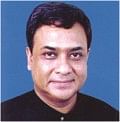<i>Palpitations –A cause for concern?</i>

Most of us at some time have experienced feeling of heart palpitations. This is an unusual and unpleasant awareness of the heartbeat. Most people who complain of palpitations describe them as a pause, often followed by a particularly strong beat or as periods of rapid and irregular heartbeats. Sometimes a short burst of palpitations can be a completely normal reaction to fear, demanding exercise or excitement.
The heart's rhythm may be normal or abnormal. Palpitations can be felt in chest, throat, or neck. Some persons with palpitations have no heart disease or abnormal heart rhythms and the reasons for their palpitations are unknown. In fact, palpitations result from abnormal heart rhythms (arrhythmias) — refer to heartbeats that are too slow, too rapid, irregular, or too early.
There are many different causes for palpitations. Common causes are 'anxiety – stress – fear', exercise, caffeine, nicotine and fever. Palpitations are often caused by psychological disorders, such as panic attacks or depression. It can be due to hormone changes associated with menstruation, pregnancy or menopause as well.
An electrolyte abnormality in blood (e.g. a low potassium level) can also cause heart palpitation. This can be connected to certain medications, such as pseudoephedrine, an ingredient in some cold and allergy medicines, thyroid pills, asthma drugs or beta blockers. This can be also caused by anaemia or low levels of oxygen in your blood.
Palpitations are usually not serious. However, occasionally, it can be a sign of a serious; underlying problem such as hyperthyroidism or an abnormal heart rhythm (arrhythmia).
Arrhythmias may include 'tachycardia', 'bradycardia' or an irregular heart rhythm (atrial fibrillation). Normally the heart beats 60-100 times per minute. In people who exercise routinely or take medications that slow the heart, the rate may drop below 55 beats per minute. If heart rate is very fast (over 100 beats per minute), this is called tachycardia. Talk to your doctor in that situation (over100/mt without exercise, anxiety, or fever).
An unusually slow heart rate is called bradycardia. In other words, there are many different causes for palpitations related to heart diseases or an abnormal heart valve. To be on the safe side, it is better to consult a qualified doctor. He or she may recommend further evaluation such as heart monitoring tests. But look for prompt medical attention if heart palpitations are accompanied by dizziness, shortness of breath, chest discomfort, chest pain or fainting.
Also get in touch with a specialist doctor immediately if some one feels frequent extra heartbeats (more than 6 per minute or coming in groups of 3 or more).
Reducing the caffeine intake will notably reduce ones heart palpitations. Changing frantic lifestyle and reducing stress can help lessen the incidence of palpitations. Try breathing exercises or deep relaxation when palpitations occur. Keep a record of how often you have palpitations, when they start, lasting phase and heart rate at that period. This information may help your concerned doctor to figure out about the underlying cause.
Fortunately, palpitations are generally short, and the majority of them are not severe. But serious palpitations can be caused by an underlying heart-related condition and anyone who has experienced palpitations is strongly encouraged to see a qualified doctor to diagnose the condition.

 For all latest news, follow The Daily Star's Google News channel.
For all latest news, follow The Daily Star's Google News channel. 



Comments